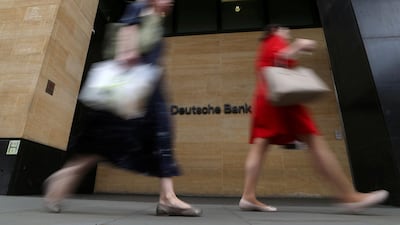For anyone still unsure whether Deutsche Bank really needs radical change, the latest trading results should put their doubts to rest.
Revenue from buying and selling securities fell 12 per cent in the second quarter, once again underperforming the biggest US rivals, as the equities trading business that the bank is now exiting slumped by almost a third. The bank posted a bigger net loss than it previously indicated as it booked more restructuring charges in the quarter.
The results underscore the long decline of the investment bank, once one of the biggest in the world. Discussions about the future of the unit compounded the impact of Wall Street's worst first half for securities trading in a decade. In an effort to put Deutsche Bank on a sounder footing again, chief executive Christian Sewing this month unveiled the biggest cutbacks ever to the investment bank, including the wholesale exit from equities trading.
The bank booked €3.4 billion euros (Dh13.9bn) of restructuring charges in the quarter, more than it had previously guided, resulting in a €3.2bn net loss for the second quarter. The pullback from trading equities and some interest rate securities will cost Deutsche Bank €2.5bn in revenue, the company has said.
Deutsche Bank's trading result in the second quarter compares with a decline of almost 8 per cent at the five biggest Wall Street banks. UBS Group on Tuesday reported a 9 per cent slump in equities trading and 7 per cent lower revenue from fixed income.
As part of its exit from equities trading, the German lender agreed to transfer some €150bn of balances linked to hedge funds to French rival BNP Paribas, but clients have been pulling about $1bn of funds per day and going elsewhere as the firms iron out the details, people familiar with the matter have said. Sergio Ermotti, the UBS chief executive, said Tuesday that some of the balances are coming to his bank's prime brokerage unit.
The German lender's overhaul also resulted in the departure of the investment banking head, Garth Ritchie. Sewing has taken over oversight over the division at the management board level while operational oversight has been split between Stefan Hoops, who leads the newly created corporate bank division; Mark Fedorcik, head of the investment bank; and Ram Nayak, in charge of fixed-income trading. Christiana Riley, who's running the bank's US operations, will join the management board pending regulatory approval.
Deutsche Bank has promised investors it will increase group revenue adjusted for the equities pullback by about 2 per cent per year. It aims to boost profitability -- measured as return on tangible equity -- to 8 per cent in 2022. The last time the lender has achieved a similar level, which is generally perceived as an adequate return for investors, was in 2011.

